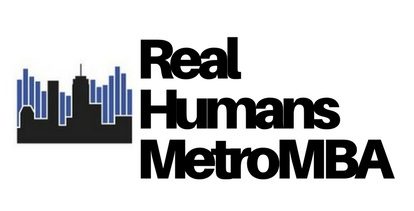Real Humans of the University of Michigan Ross School of Business Part-Time MBA Program

For MBA hopefuls looking to enroll in a part-time program in the United States, there is a certain unspoken caveat. While the part-time is often presented as the malleable, flexible alternative to the traditional full-time program, it is often just a different restrictive version. For many schools, even some of the most prestigious in the country, the choice between full-time and part-time is simply just two options. However, the University of Michigan Stephen M. Ross School of Business has continually expanded the parameters of what a part-time program can truly be.

The Michigan Ross part-time MBA, ranked as the sixth best in the country according to U.S. News & World Report, isn’t simply a longer version of the full-time offering. Rather, the school gives potential students three indelibly different avenues to take. The 60 credit part-time Evening MBA, perhaps the most “traditional” part-time offering from the school, allows students to craft their own academic schedule, with classes offered after work on weeknights, weekends, and online. Some courses can even be taken during the day with the full-time MBA cohort at the school’s Ann Arbor campus. The part-time Weekend MBA offers a more compressed schedule, in comparison, with classes held every other weekend. In contrast to the Evening MBA offering, which takes three-to-four years to complete, the Weekend MBA offering can be finished in just two years.
Two part-time MBA variations may not seem unconventional, but few schools regularly lauded as much as Michigan Ross (10th overall in U.S. News & World Report, 19th globally in Bloomberg) also have the option of an Online MBA.
In late 2018, Michigan Ross introduced its brand new Online MBA program, embracing the ever-changing business school landscape head on. It wasn’t too long ago that the idea of an online degree, never mind an online MBA, was met with heavy skepticism, with major academic institutions sticking with traditional degrees despite the oncoming sea change. And while the inclusion of the online option to its part-time MBA opportunities may have seemed unorthodox at first glace, the administration crafted it as carefully as it does all its MBA programs.
In a recent interview with MetroMBA, Anne Schoen, Associate Admissions Director of Part-Time MBA Programs, talks about how the Online MBA features all-important elements found all of the school’s MBA curriculum:
“One of the signature features of a Michigan Ross MBA is an emphasis on action-based learning, and our Part-Time MBA: Online is no exception. Our three required on-campus residential experiences and required Multidisciplinary Action Project (MAP) course set us apart from other online programs. Our students will enjoy the flexibility of an online program, but also will benefit from engaging in-person with faculty and fellow students during these fully immersive experiential learning projects. These experiences will require that students take the theories they learn in class and apply them to real-world business scenarios. We also will offer our online students full access to our Career Development Office resources, including assistance with on-campus and off-campus recruiting, and individualized career development planning.”
When talking with several Michigan Ross part-time MBA Class of 2020, the school’s expansive options seem to reflect the diverse background of its students, of which include an experienced engineer from Kanpur, India, a former restaurant manager from New England, and a Canadian chemist, among others. Read on to see their stories and what the future may hold for life after an MBA.
Flex Advantage: Finding Which MBA is Right for you at UC San Diego

Sponsored Content
On the surface, a part-time MBA decision has obvious benefits. In contrast with full-time MBA degrees, scheduling is often much more flexible, allowing students to complete the program on their own time while continuing their careers outside of the classroom. However, there are more factors that go into the decision-making process before enrolling in business school. How experienced are the faculty? What kinds of experiences can you earn at one school that you cannot at another?
The multiple part-time MBA options at the University of California San Diego Rady School of Management offer consummate answers to these enduring questions. Its FlexWeekend and FlexEvening programs do not fit the traditional part-time MBA billing. Rather, it incorporates elements of the full-time, part-time, and Executive MBA offerings you may find split at many other top-ranked schools, giving students a definitively unique learning opportunity.
Finding the Best Pacific Northwest Part-Time MBAs

The Pacific Northwest, one of the country’s top hubs for innovation and creativity, offers numerous job opportunities in finance and tech. It also boasts an impressive array of MBA programs.
For those living in the region who want to pursue a b-school degree without interrupting work or other commitments, a part-time MBA is a clear choice. Take a look below at some of our favorites.
The Best Pacific Northwest Part-Time MBAs

The Foster School of Business at the University of Washington Evening MBA is a three-year MBA offered at was is largely regarded as the best business school in the U.S. Northwest. Bloomberg considers it not just one of the 20 best business schools in the country, but one of the 20 best in the world. And its Evening MBA program is ranked even higher by U.S. News & World Report, placing it 12th overall.
The current total cost of the program, including tuition and fees, is $85,321. In comparison, the UC Berkeley Haas School of Business part-time MBA, ranked as the 2nd best in the U.S., costs more than $140,000 for the entire program. Foster’s most recent Evening MBA class features 122 students (39 percent female, 61 percent male). They enrolled with an average undergraduate GPA of 3.39, a GMAT average of 631, and more than six years of prior work experience.

At Seattle University’s Albers School of Business and Economics, the Professional MBA features 54 credits comprised of 24 required core courses and 30 electives. With two thirds of courses designated as electives, students are able to hone in on their areas of specialty, taking their skills immediately to work. About 83 percent of the Albers student body is made of part-time students, and on average, students have nine years of work experience. Tuition is one of the most affordable in the region at just $46,710, not inclusive of fees and expenses.

Seattle Pacific University School of Business, Government and Economics’45 credit part-time program offers students weekend and evening classes, and takes two or three years to complete. Foundation courses comprise 27 credits, 18 are in Advanced Strategy and Management, and there are six credits each for ethics and leadership and behavioral skills. Electives are categorized into Management, Finance, Human Resources, Social & Sustainable Enterprise, Data Management, and IT. Seattle Pacific prides itself upon its ethics curriculum; it is the home of the University’s Center for Integrity in Business. Tuition is just $64,080.

Portland State University College of Business Administration’s MBA’s part-time option, one of the best outside of the state of Washington, can be completed in 21 months—making it one of the more efficient options in the region. Classes take place in the evening, and part time students take core courses only. The three focus areas of the curriculum are Foundations of Competitiveness, The Value Chain of Business, and Applied Skills & Leadership. Part-time MBA students at Portland State have an average of 7-10 years of experience. Tuition is also highly-affordable—just $48,980 for out of state students and $37,642 for those in state.

At the University of Oregon’s Lundquist College of Business, working students can choose the Flex MBA with a two, three or four year option. This degree is designed for students with significant work experience and a background in quantitative skills. Core courses do not count toward the Flex MBA, and the 45 credits are comprised of 15 different three or four credit courses in specialization areas and electives. Tuition is among the best in the region, at just $28,377 for Oregon residents and $39,273 for out-of-state students.

The 5 Best Part-Time California MBA Programs

Despite the various challenges of doing business in California, the Golden State remains a powerful driver of business and tech innovation in the U.S. The state even outpaces Great Britain’s GDP in 2018, making it the world’s fifth-largest economy.
For business leaders looking to advance their careers in California without interrupting their current gig, a part-time MBA might be the optimal choice. Let’s take a look at the five best part-time California MBA programs.
5 Best Part-Time California MBA Programs

The UC Berkeley Haas School of Business Evening and Weekend MBA program was named best in the nation by U.S. New & World Report in 2019. This part-time MBA degree is typically completed in two-and-a-half-to-three years, affording students easy access to the Bay Area’s plethora of internship and employment opportunities. The experiential learning focus of the program ensures students have ample opportunities to take on hands-on projects as part of their studies. Tuition for part-time in-state students is $3,363 per credit and $3,363 per credit for out-of-state students.

The UCLA Anderson School of Management’s Fully Employed MBA Program (FEMBA) has been touted as “#1 in SoCal” for over 20 years by U.S. News & World Report. Anderson FEMBA students have three choices when it comes to the scheduling of their part-time MBA: Classes all-day on Saturdays, Tuesday, and Thursday evening classes, or the hybrid schedule, which combines online study with one weekend visit to campus each month. Participants can expect to spend two-and-a-half-to-three years to complete the FEMBA (with both accelerated and extended study options also available). FEMBA has a distinctly international focus, with a diverse student body, access to international study opportunities, and a required international project. Tuition is $42,420 per year.

The USC Marshall School of Business part-time MBA is ranks among the top 15 in the nation, according to U.S. News. The degree is designed specifically for early-career professionals and managers looking for a flexible schedule. The curriculum is divided into core business courses, all taken in the first year, then over 100 electives from which to choose. First-year MBAs can opt for one of two campuses in Los Angeles proper and just outside the city limits. The program duration is three years, and both accelerated and extended are available. With “deep roots” in Southern California and a global alumni network, part-time tuition is $1,912 per credit.

Santa Clara Leavey’s School of Business Evening MBA ranks in the top five part-time programs both among California state schools and national Jesuit schools. With evening classes twice per week, participants can expect to take two years to earn their MBA and must have at least three years of related work experience to begin the program. Located in Silicon Valley, Leavey offers students prime geographic access to tech companies for networking and employment opportunities. Part-time tuition is easily among the most affordable of the high-ranking CA schools, at $1,108 per credit.

The part-time MBA at UC Davis’s Graduate School of Management ranks in the top 9 percent nationally (28th overall). Students take Friday and Saturday classes at campuses in either Sacramento or the Bay Area and can choose between a two-year and four-year pace for their degree. The flexibility in location allows students the option of access to professional benefits of Bay Area or Sacramento. UC Davis also boasts an 83 percent first-year ROI following graduation. Tuition for part-time students is $1,520 per credit for in-state and out-of-state applicants.
The 5 Best Northeast Part-Time MBA Programs

As applications to full-time MBA programs have waxed and waned in recent years, there is understandably quite a bit of speculation about the future of the degree. While full-time applicants might be dipping in the U.S., the explosion of part-time programs making the business school experience more accessible to a whole new swath of people.
We’ve already taken a look at the best part-time offerings in the Midwest and DC metro, but which programs come out on top when it comes to the Northeastern U.S.?
The 5 Best Northeast Part-Time MBA Programs

The NYU Stern School of Business’s Langone part-time MBA rates as the fourth best part-time MBA program by U.S. News and World Report.
The program features an accelerated option allowing students to opt for a flexible class schedule, as well as evening and weekend courses to complete their MBA in two years without interrupting their work schedule. Current Langone students, faculty, and alumni have access to the Langone Speaker Series, which “… provides a unique platform to deepen conversations about timely events with the decision-makers that are helping shape today’s industries.”
Students can also expect the Langone LAB, a concentrated one-day orientation program that connects incoming participants with classmates, professors, clubs and other opportunities.
The current tuition rate for the NYU Stern part-time MBA is $2,228 per credit. Over the course of the required 60 credits, this total comes to $133,680; which does not include the cost of living on campus for those opting to live near the university.

The University of Massachusetts Amherst Isenberg School of Management, one of the more underrated business schools in the crowded academic metro, offers a customizable part-time MBA to fit the student’s preferred focus, available in one of six areas: business analytics; entrepreneurship; finance; healthcare administration; marketing; and sports management.
Classes can be taken either completely online (Isenberg’s online MBA was first in the country, founded in 2001) or in-person at the Amherst campus. To help expedite the education process, part-time MBA applicants can even choose to take up to two courses during the application process. In addition, the UMass Amherst part-time MBA tuition is among the most affordable in the entire Northeast, at a total cost of just $35,100 ($900 per credit). For the 17th highest ranked part-time MBA program in the entire U.S., the cost saving is hard to ignore.

The Boston College Carroll School of Management’s part-time MBA program, ranked 28th overall by U.S. News & World Report, operates much like the aforementioned Amherst part-time program, with the option to take classes both in person or online. However, the entire program cannot be completed remote, with a maximum of 30 percent of classes available online.
A staggering number of electives are available in the program: over 150 overall. Students can complete the program on a fairly flexible schedule, with the option to complete it in two, three, or four years. In addition, the BC Carroll part-time program is one of the only ones on the list that does not require GMAT/GRE scores for entry.

The part-time FLEX MBA program at Lehigh University’s College of Business and Economics is geared toward working professionals who want more control over the pace of their MBA learning experience. Program formats include part-time, accelerated, and online. The ClassroomLIVE feature offers students the option to attend classes in-person, on campus, or in real-time online.
Students can also opt to get their feet wet with an Executive Certificate as part of the part-time MBA track. Tuition for Lehigh’s Flex MBA program $38,700 for the full 36-credit program, with the current cost per credit hour at $1,075.

Villanova School of Business, the 35th ranked part-time program in the country, offers part-time MBA students two distinct format options: The accelerated “Fast Track” program, and the “Flex Track” program, which offers evening, weekend, half-semester, and online course choices so students can work at their own pace.
Tuition and the length of time to complete Villanova’s various part-time programs varies. The Fast Track program costs $1,190 per credit and takes 24 months to complete, while the Flex Track costs $1,065 per credit and typically takes three years to complete. However, the Flex Track can last as long as seven years.
Top 5 Part-Time MBA Programs in the Midwest

Balancing a job and graduate school isn’t easy. You have to make a lot of sacrifices when it comes to how you spend your time. Hanging out with friends will be replaced with studying, and staying late at work or working on weekends will be replaced with heading to class. It’s a difficult path through the results should be well worth the effort if you choose a quality part-time MBA program.
For those living in the Midwest, choosing the right part-time MBA program is not easy. Many of the highest ranked part-time MBA programs (according to the U.S. News & World Report) call the Midwest home. So, what’s the best program for you and why?
We’re taking a look at the top five part-time MBA programs in the Midwest and telling you how they rank and why you should consider them. Continue reading…
